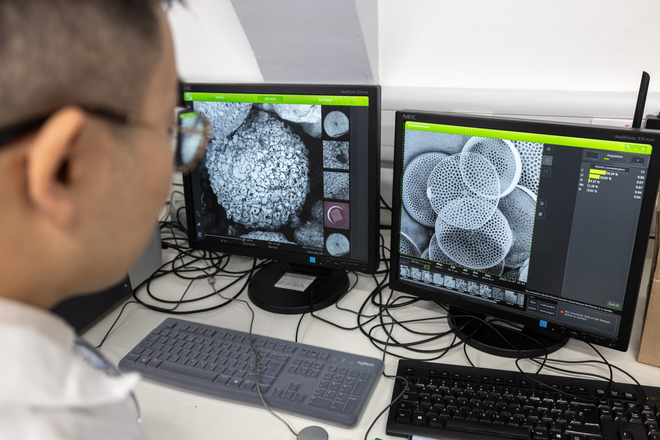From making better things to making things better
Research themes

Regenerative ecosystems - Beyond net zero
As environmental challenges intensify, it's not enough to simply minimize environmental impact. This theme explores how we can rethink our use of resources; moving beyond net zero to create systems that give back to the environment. Our research focuses on developing innovative materials, energy systems, and processes that not only reduce waste and carbon emissions but also regenerate natural resources and ecosystems. By rethinking how we source, use, and cycle resources, we aim to build a future where industrial and ecological systems are in harmony, leading to a truly sustainable world.
.png)
Smart futures – Intelligence of everything
As the digital and physical worlds converge, the integration of intelligence into every aspect of our lives is reshaping the future. This theme explores how we can harness the power of AI, IoT, and data-driven technologies to create smart systems that enhances our world. Our research focuses on developing innovative solutions that connect and optimise everything from urban infrastructure to personal devices, aiming to build a future where intelligent systems drive efficiency, sustainability, and improved quality of life.
Research themes 2
.png)
Augmented living – Enhancing healthy lifestyles
As technology increasingly integrates with daily life, there is immense potential to enhance well-being through innovative solutions. This theme focuses on how design engineering can augment everyday experiences to promote healthier lifestyles. By leveraging advancements in wearable technology, smart environments, and personalised health systems, our research aims to create solutions that support physical and mental well-being, empower individuals, and foster a more balanced and health-conscious society.
.png)
Adaptive horizons – Resilient growth
In a rapidly changing world, resilience is key to sustainable progress. This theme explores how we can create systems and solutions that adapt to evolving challenges while fostering long-term growth. Our research focuses on developing flexible, scalable technologies and strategies that enable communities, industries, and ecosystems to thrive despite uncertainty, ensuring that growth is not only sustainable but also resilient to future disruptions.
Research themes
.png)
Peer-to-peer society – A shared world
As society evolves towards more decentralised and collaborative models, the concept of a peer-to-peer society is becoming increasingly relevant. This theme investigates how we can facilitate the creation of systems that empower individuals to share resources, knowledge, and opportunities directly with one another. Our research aims to develop innovative platforms and technologies that support equitable access, foster community-driven initiatives, and enable a more inclusive and sustainable world where collaboration is at the heart of societal progress.
.png)
Equality in evolution – A responsible society
As technology evolves, ensuring that advancements contribute to a fair and just society is essential. This theme focuses on how we can create responsible solutions in emerging technologies, such as AI and automation. Our research emphasises the importance of ethical considerations, inclusivity, and social responsibility, aiming to develop technologies that empower all individuals, reduce disparities, and contribute to a society where technological progress aligns with human values and equality.
Underpinning research activities
Underpinning our research themes is core capability in the following areas; where each research theme draws expertise from these capabilities, allowing for a holistic approach which draws from multiple domains of expertise.
- Human-centred design and experience
- Sustainability and energy
- AI and data science
- Intelligent systems and robotics
- Engineering design and manufacturing
- Entrepreneurship and innovation
Contact us
Dyson School of Design Engineering
Imperial College London
25 Exhibition Road
South Kensington
London
SW7 2DB
design.engineering@imperial.ac.uk
Tel: +44 (0) 20 7594 8888